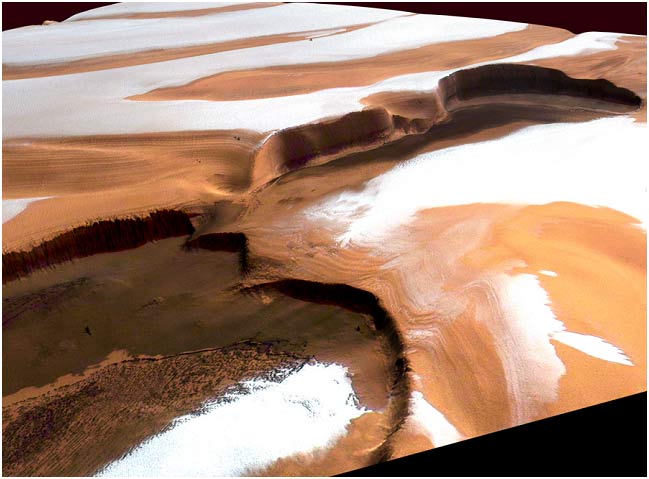Mars Once Shuffled Its Icy Poles

Mars, as itturns out, once had a propensity for juggling its polar ice caps from one endof the planet to the other.
A perennialwobble in Mars? tilt pushed one pole closer to the sun, causing water ice toevaporate and refreeze at the colder pole, new research shows. Every 51,000Martian years, the wobblewould bring the colder pole closer to the sun again and shuffle the ice capback to the opposite pole.
?It was avery slow cycle,? said planetary scientist Franck Montmessin of the Service d'A?ronomiein France. ?But something stopped the cycle, and we don?t know what it was. This is another great mystery for Mars?polar ice caps.?
Frostybeverage effect
Montmessinexplained that drastic temperature differences at each pole helped drive thecycle.
As the sunevaporated water icefrom the warmer pole, the vapors eventually made their way to the opposite pole.Once the water reached the chilly terrain pointed away from the sun, it refroze.
The processis similar to what happens to humid air when it?s introduced to an ice-coldbeverage glass--water vapor condenses on the surface and turns to ice.
Breaking space news, the latest updates on rocket launches, skywatching events and more!
In thisway, millimeter-thin layer by layer, Mars? waterice cap slowly migrated to the cooler pole. But the research team thinksthe curious cycle no longer occurs.
Montmessinand his team combined Mars Express orbiter data with advanced computer modelsof the Martian climate to produce the findings, which will be detailed in anupcoming issue of the Journal of Geophysical Research-Planets.
Ice-cappedice
So far, theresearch team?s best explanation for the multi-millennia-long cycle's end isthat a thick slab of dry ice, or frozen carbon dioxide, cappedthe water ice in Mars? southern pole.
Montemessinthinks understanding how the cycle?s interruption occurred will yield more ofMars? secrets, including explanations for the forces that fuel globaldust storm activity on the planet.
?We?re slowlyputting the pieces together and figuring out how the process stopped,? he said."If we want to understand conditions on Mars that are further in the past,we first need to understand the recent past.?
- Video: A Wet Modern Mars?
- Mars Ice is Mostly Water: Good for Biologists, Bad for Terraformers
- Video: Mars Reconnaissance Orbiter
Dave Mosher is currently a public relations executive at AST SpaceMobile, which aims to bring mobile broadband internet access to the half of humanity that currently lacks it. Before joining AST SpaceMobile, he was a senior correspondent at Insider and the online director at Popular Science. He has written for several news outlets in addition to Live Science and Space.com, including: Wired.com, National Geographic News, Scientific American, Simons Foundation and Discover Magazine.
